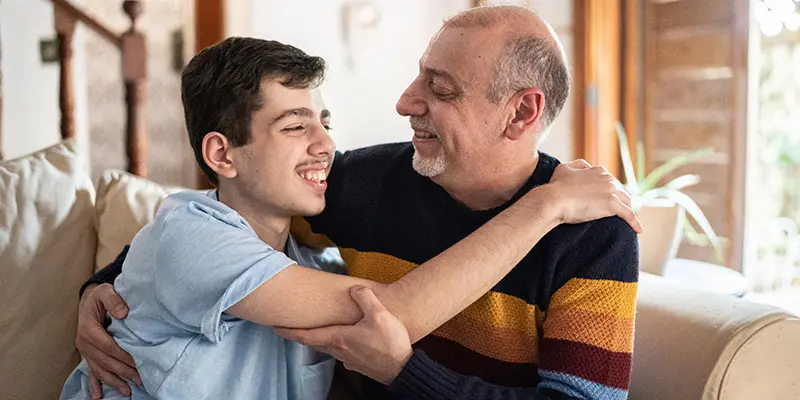
In 2021, at the age of 47, Hollywood film composer, record producer, YouTuber, and influencer Stephen Hilton discovered he had autism spectrum disorder (ASD). While he lived his life using his extraordinary musical talent professionally, enjoying great success, he also suffered painfully with the challenges his condition presented. In an interview with Dr. Daniel Amen, Stephen revealed how he “masked” his intense discomfort with social interactions in his work, had trouble regulating emotions, experienced difficulty in personal relationships, and carried an inner feeling of “being a problem.” He also struggled with alcohol and drug addiction off and on for many years.
It was only when his son was diagnosed with autism that he began to recognize his own undiagnosed autistic traits and finally sought help from Amen Clinics, where he received an ASD diagnosis. Every day is now an opportunity for him to learn new ways to manage the challenges of being an adult with moderate ASD.
Stephen is not alone. Nearly 5.5 million adults live with autism in the U.S. today, according to Centers for Disease Control and Prevention (CDC) data. There are likely millions more adults who operate in the world with undiagnosed ASD. There’s a lot of information available about the challenges autistic children face, and too little about autistic adults. Here’s what it is like for adults with ASD.
Adults on the spectrum may have a number of cognitive strengths. For instance, they can have an intense interest and aptitude for math, music, art, science, and computer science.CHALLENGES OF ADULT AUTISM
For those who are diagnosed with autism in childhood, there can often be improvements in communication skills, and sometimes in other areas affected by the disorder in adulthood, according to research. That said, it’s extremely rare that an individual improves to a degree that they are no longer considered autistic.
Adults with autism must contend with the core characteristics of ASD while navigating life, which may include any of the following: deficits in speech and nonverbal communication, executive functioning, and social interaction; and hyper- or hyposensitivity to sound, light, smells, tastes, and touch.
Research from the CDC shows that young adults with autism lag behind their neurotypical peers. They have higher rates of unemployment and under-employment, lower participation in college-level education, less likelihood of living independently, and limited social interaction (about 40% spend barely any or no time at all with friends).
Adults with severe ASD struggle even more. Roughly 25-30% of ASD adults who were either non-verbal or minimally verbal starting in childhood, often remain so in adulthood. Individuals with severe autism also tend to be more aggressive toward others, especially their caretakers. These impairments make it nearly impossible for them to successfully manage typical living situations or jobs.
Although higher-functioning ASD adults fare better, they struggle with appearing neurotypical when they still must grapple with severe anxiety, sensory issues, and difficulties with social interactions and communication. The cacophony of sounds, onslaught of digital information, social interactions, and visual stimulation that make up modern living, can easily overwhelm an adult with ASD.
Autistic adults often struggle to find and maintain friendships and romantic relationships, as well as jobs—especially ones that require organization/planning skills and social interactions.
In terms of mental health, rates of co-occurring conditions are higher in autistic adults than in the general population, research has found. In fact, an estimated 54% of adults with ASD have at least one co-occurring psychiatric condition such as ADD/ADHD, OCD, anxiety, mood disorders, psychotic disorders, and others.
Behavioral issues are common too. About 46% of autistic adults struggle with being disruptive, engaging in self-harm, or being destructive. The incidence of mental health issues in autistic adults increases with age.
While these stats are sobering, there are reasons for hope. For as much as ASD makes life challenging, there are beautiful and unique strengths that come with having a neurodiverse brain (a brain that works differently).
ADULT AUTISM STRENGTHS
Adults on the spectrum may have a number of cognitive strengths. For example, they can have an intense interest and aptitude for math, music, art, science, and computer science. ASD individuals can also have exceptional long-term memory skills, be good visual learners, and exhibit strong, rule-based thinking. All of these traits can lend well to specific jobs and careers. In fact, Harvard Business Review reports that a growing number of highly competitive corporations have updated their HR processes to access neurodiverse (which includes ASD) talent. These are prominent companies such as Microsoft, Hewlett-Packer Enterprise, Ford, SAP, and others.
Autistic adults were interviewed in a 2019 study about what ASD traits helped them in different areas of their lives. They noted that their creativity, strong memory, ability to hyperfocus, attention to detail, honesty, loyalty, and empathy were among the most helpful traits. But like so many of the traits that go with autism, these very same traits could be problematic at times, depending on the circumstances.
ADULTS WITH UNDIAGNOSED AUTISM
Some research has led experts to believe that for every three adults diagnosed with autism, approximately two go undiagnosed. It is only in recent decades that autism started to become widely recognized and understood with protocols for early screening in childhood. Previously, children with less obvious symptoms—or misdiagnosis, found their way into adulthood without proper diagnosis or treatment. Unfortunately, when ASD goes untreated or is misdiagnosed, negative symptoms tend to worsen.
In adults with milder forms of undiagnosed autism, quirky personality traits or unique behavior may be written off by family, friends, and colleagues as being “eccentric.” It’s not uncommon for ASD adults to mask discomfort around social interactions. Of course, troublesome behavior, like aggression and emotional outbursts, can make adults with undiagnosed ASD feel bad and misunderstood. And too often, these shameful and bad feelings can lead to the noted self-destructive and self-injurious behavior.
Indeed, in recent years, research has found that autistic adults with a high IQ are more than two times as likely to become addicted to alcohol or other drugs as their peers are. The risk is even higher for individuals who have co-occurring conditions, such as ADD/ADHD.
GET SCREENED FOR ADULT AUTISM
There is a silver lining here. With proper diagnosis and treatment, adults with autism can vastly improve their quality of life. They can learn to strengthen mood regulation, boost their speech and learning, practice ways to self-soothe, and use the special gifts and talents that come with being neurodivergent. If you recognize symptoms of ASD in yourself or a loved one, consult a medical professional who specializes in diagnosing and treating autism as soon as possible.
Autism spectrum disorder in adults and co-occurring mental issues can’t wait. At Amen Clinics, we’re here for you. We offer in-clinic brain scanning and appointments, as well as mental telehealth, clinical evaluations, and therapy for adults, teens, children, and couples. Find out more by speaking to a specialist today at 888-288-9834 or visit our contact page here.





While I'm glad this is being brought to light, there is some offensive language and content. The terms high functioning and low functioning are severely outdated. Please consult actually autistic adults when writing about us.
Comment by Kelly — April 26, 2023 @ 3:26 AM
Have watched my adult twin struggle for years with dealing with social and symptoms of Autism un diagnosed,
Yet they are very high levels in math and computers and even language , but not able to apply some of there talents because of lack of the social skills . They do not believe they have any problems yet at this stage of their life i am there only support and friend . Is there any way I can get them back in the social world and diagnosed
Thank you so much Jeanne Crayne
Comment by Jeanne Crayne — April 26, 2023 @ 6:24 AM
Our 20 yo granddaughter was recently diagnosed as having Autism. ADHD. she has been an over-achiever in in academics, but recently told us she feels like she cheated her way through school, because she didn't always know the answers, but was able to do the tests. She was musically talented wrote wonderful music and lyrics and her poems won many awards. When she took some test with a psychologist, he wondered if she had actually exaggerated some of her answers, which made her break down and run out of his office in tears. She found out that her answers, were so above the charts he had a hard time , discerning who he saw sitting in front of him and what he was reading from her test score.
Along with the mental factors our granddaughter struggles with numerous autoimmune disease. We have all been diagnosed with Celiac both HLA-DQA1/DQ2.5 and HLA- DQB1/DQ8,. She has Neuropathy from the fathers side. She's been diagnosed with Fibromyalgia, found on both sides of our families. And numerous others that have spawned off her over active HLA system. She went through most of the eating disorders, and many self-destructive like cutting and over-dosing on over-the -counter meds.
I had just read a report of two genes that are being linked to Autism/ADHD, the COMT and MTHFR, I looked them up on our 23&Me and sure enough, my husband carried the COMT and I carried the MTHFR, both passed to our daughter and to her daughter. Along with ours genes, her birth father carried those same gene giving her combinations that put her in what for some would have been severe Autism. Which both her younger 1/2 brothers from another mother, had been diagnosed at very young ages as clinically severe Autistic and ADHD . My husband and I have gone through various studies and actually find that some of what we experienced in our youth, could very well have been one or the other or both. Our daughter was a high functioning alcoholic,. She graduated from college with high honors and was always employed and well liked by her employers and if very community involved. But her self-deprecation and destruction nearly cost her her life numerous times.
And then I have Alzheimer's on my side, my mother passed from it and my older sister id struggling with it. I carry an APOE4 gene, but didn't give it to our daughter. I am trying everything to stave off what might be my fate, which are the basics to good health anyway, eating a clean diet, exercise , sleep and reducing stress. Thanks for listening.
Comment by Roberta Eveland-Williams — April 26, 2023 @ 7:30 AM
Is there anyone out there in the world who doesn't have a mental health issue that "we", the world audience, views negatively? I'm very tired of feeling like I have to explain (to myself usually) my behavior oddities. Tell me please, is anyone out there truly NOT have any of the "idiocyncracies" of a neruodiverse personality? Or perhaps, is all this diagnosing more a symptom of a world population that can't accept differences in humankind?
Comment by Jean Williams — April 26, 2023 @ 8:32 AM
Yes. When I was in therapy I told my psychologist I felt different. I can do so many things my friends won't ever try to do. I moved to Florida because I love to go outside every day and work in a garden. My family and friends stayed in frigid Pennsylvania. I was in doctors office every month sore throat coughs and pneumonia since I was 5 yrs old. I was sick every holiday season.
My mother understood she also moved away from PA to Ohio when she was young. I promised to visit her. She gave me her blessing. Dad never forgave me. He refused to give me and my kids any attention no calls no letters no visits. I visited them 18 trips in 25 yrs while she lived.
He would leave us to visit my sister. She called him. He said he had to go. I think my psychologist is right. My father had ADHD. He refused to be pay us love time or attention. It was like we were all there together but he would not relate.
Mom was fine. We talked. We planned things to do together. He would not go with us. Only thing he planned was casino and he would leave us by ourselves. Other men stay with their wives at a casino. He always wanted to be alone. Attention is the answer. He would not pay attention. Reading newspaper blocking us out. Turn on classical music. We were not allowed to talk to him. Mom told us she's going to bed. Tell your father to warm up his food. He was brutal mentally and emotionally and physically violent man to Mom. I protected her. I taught myself never be afraid of him. I stood up to him many times. I met a man worse than him. A severe alcoholic. He took us out to dinner every week but we were not allowed to plan holidays with him. He stayed home. I had to stand up to him too.
I had a car. My kids and I went everywhere. We visited Mom. She went with me everywhere. Two women visited each other no matter what two very difficult men thought or said. She told me. Nobody is going to stop me from visiting my daughter and grandchildren. Thanks to my Ukrainian Mom who was so afraid to tell us of her European heritage. I fight too every day. My Ukrainian heritage has kept me fighting conflicts with people my mortgage and bank and my neighbors too. I don't care anymore. My husband left me for his wealthy family and I was upset many years. Now I'm glad he had them because I lived and enjoyed a much better life without him and my father too. I'm glad Dad shunned us 17 years after Mom died. I'm glad my husband and family shunned us after he left home. I finally have closure. Thank you for your emails. I'm understanding a lot about how my brain works and how I fight conflict always. It's a strength. Not a weakness like Dad and husband told us. You're crazy. You don't think right. Neighbors don't like you. Mom and I thought good things and love and good home cooking and reading. And God. And gardening. That's enough for me too. She's gone 22 yrs and I still feel her love. She was never afraid being home alone. She always knew what to do. I also have my bible study. Who needs a man who won't pay attention? Thank you Dr. Amen and Tana.
Comment by Donna M Hopcraft — April 26, 2023 @ 1:26 PM
The subject of ASD in Adults is close to my heart. I wrote in my previous comment that I have an adult son who has been recongnized as having Asperger's, currently ASD. I have used the word recongnized, but not officially confirmed. I do not have any doubt. I have read a number of research work, including Dr. D. Amen's publications. I do wish to contact the clinic to find out what kind of therapy my son can afford at the clinic.
Comment by Irene Skibinski — April 26, 2023 @ 1:47 PM
Great opportunity to learn valuable health sciences to enjoy aging time while serving consumers.
Comment by Duc Viet Nguyen — April 27, 2023 @ 6:36 PM